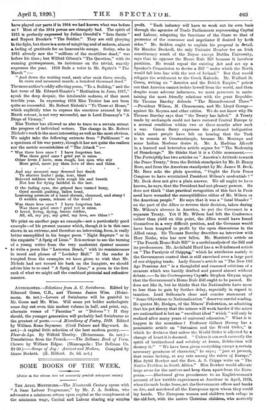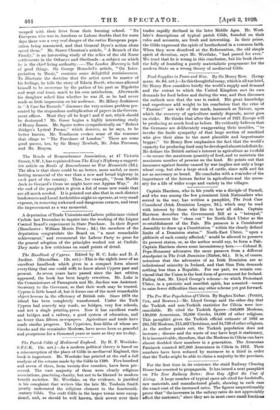SOME BOOKS OF THE WEEK.
[Notice in ibis column does not necessarily preclude subsequent review.]
Tax APRIL Mormaras.—The Nineteenth Century opens with "A Sane Labour Programme," by Mr. J. A. Seddon, who -advocates a minimum return upon capital as the complement of the minimum wage, Capital and Labour sharing any supine profit. "Each industry will have to work out its own bask through the agencies of Trade Parliaments representing Capital and Labour, relegating the functions of the State to that of protector of the consumer and negotiator if desired by both sides." Mr. Seddon ought to explain his proposal in detaiL Sir Maurice Dockroll, the only Unionist Member for an Irish constituency south of the Boyne except Dublin University, says that he opposes the Home Rule Bill because it involves partition. He would repeal the existing Act and set up a Speaker's Commission to devise a Bill "under which the North would fall into line with the rest of Ireland." But that would relegate the settlement to the Greek Kalends. Mr. Walford D. Green, writing on "America and the British Empire," points out that America cannot isolate herself from the world, and that. despite some adverse influences, we must persevere in main- taining the moat friendly relations with the great Republic. Sir Thomas Barclay defends "The Misunderstood Three" —President Wilson, ll/L Clemeneeen, and Mr. Lloyd George— against Mr. Keynes and other critics. We do not know why Sir Thomas Barclay says that "the Treaty has failed." A Treaty made by archangels could not have restored Central Europe to a normal condition within two or three months after such a war. Canon Barry expresses the profound indignation which most people have felt on hearing that the Turk is to remain at Constantinople, because Mr. Montagu and some Indian Moslems desire it. Mr. A. Hadrian Aileron in a learned and heterodox article argues for "The Modernity of Stonehenge." He thinks that it is a Celtic monument.— The Fortnightly has two articles on " America's Attitude towards the Peace Treaty," from the British standpoint by Mr. D. Henry Rees, and _from the American standpoint by Mr. James M. Beck. Mr. Rees asks the plain question, "Ought the Paris Peace Congress to have scrutinized President Wilson's eredentials ? " Mr. Beek does not give a plain answer. We all ought to have known, he says, that the President had not plenary powers. He does not think "that practical recognition of this fact in Pane need have wounded the susceptibilities either of Mr. Wilson or the American people." He says that it was a "fatal blunder" on the part of the Allies to reverse their decision, taken during Mr. Wilson's absence in America, to put the Covenant in a separate Treaty. Yet if Mr. Wilson had left the Conference rather than yield on this point, the Allies would have found themselves in a very difficult position, and the Germans would have been tempted to profit by the open dissensions in the Allied camp. Sir Thomas Barclay describes an interview with Herr Noske, who has now fallen. Mr. Marriott's article on " The Fourth Home Rule Bill" is a useful analysis of the Bill and its predecessors. Mr. Archibald Hurd has a well-informed article on "The Paralysis of Shippng," which he attributes mainly to the Government control that is still exercised over a large part of our shipping trade. Lady Simon's article on "The New Old Age Pensions Aot " is a thoughtful and reasoned criticism of a measure which was hastily drafted and passed almost without debate.—In the Contemporary Captain Stephen Gwynn urges that the Government's Home Rule Bill ought to be passed. He does not like it, but he thinks that the Nationalists have more to lose than to gain by further delay, especially in regard to taxation. Lord Selborne's clear and concise statement of "Some Objections to Nationalization" deserves careful reading. He quotes Mr. Hodges, of the Miners' Federation, as admitting • that his pet theory that the miners will work harder if the mines are nationalized is but an " excellent ideal" which " will only le realized after many years of universal education." What is tc happen in the meantime ? Professor Gilbert Murray has a pessimistic article on "Satanism and the World Order," in which he declares that unless the World Order is aftected by a change of heart it is doomed. "Unless it can seek earnestly the spirit of brotherhood and sobriety at home, Bolshevism will destroy it." "We have been given everything except a certain necessary greatness of character," he says ; "just at present, that seems lacking, at any rate among the rulers of Europe." Miss Sybil Bowker and the Rev. A. S. Crippa write on "The Native Problem in South Africa." Miss Bowker would allocate large areas for the natives and keep them apart from the Euro. peana—Blackwood gives prominence to an Englishwoman's account of her terrible experiences at Amritsar in April, 1919, when the mob broke loose, set the Government offices and banks on fire, and murdered all the Europeans upon whom they could lay hands. The European women and children took refuge in the old fort, with the native Christian ohildren, who narrowly
sseaped with their lives from their burning school. "No European who was in Amritsar or Lahore doubts that for some days there was a very real danger of the entire European popu- lation being massacred, and that General Dyer's action alone saved them." Mr. Storer Clouston's article, "A Branch of the Family," is an interesting study of the relics of the old Norse settlements in the Orkneys and Shetlands—a subject on which he is the chief living authority.—The London Mercury is full of good things. Sir George Henschel's article, "On Inter- pretation in Music," contains some delightful reminiscences. To illustrate the doctrine that the artist must be master of his feelings, he tells the story of Edwin Booth, who once allowed himself to be overcome by the pathos of his part as Rigoletto and wept real tears, much to his own satisfaction. Afterwards his daughter asked him whether he was ill, as he had never made so little impression on his audience. Mr. Hilary Jenkinson in "A Case for Records" discusses the very serious problem pre- sented by the stupendous multiplication of papers in the Govern- ment offices. Must they all be kept? and if not, which should be destroyed ? Mr. Gosse begins a highly interesting study of Henry James. Mr. Squire writes sympathetically on " Robert Bridges's Lyrical Poems," which deserve, as he says, to be better known. Mr. Tomlinson evokes some of the romance that clings to "The Foreshore of London." There are some good poems, too, by Sir Henry Newbolt, Mr. John Freeman, and Mr. Binyon.



































 Previous page
Previous page